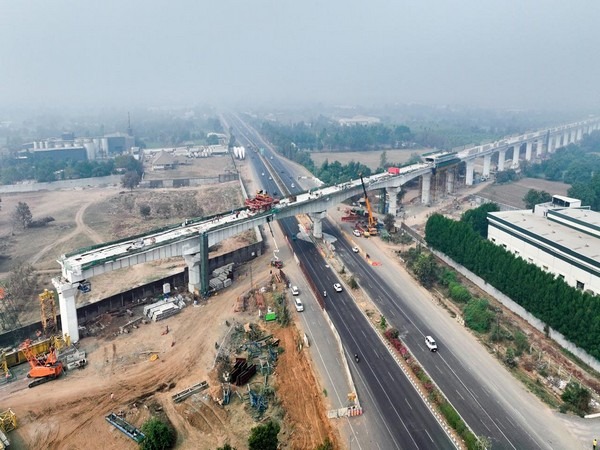New Delhi [India], January 16: Electrification work has officially begun on the Mumbai-Ahmedabad Bullet Train corridor, with the first two steel masts erected at a height of 14 meters from the ground level between Surat and Bilimora Bullet Train Stations in Gujarat.
According to a statement from the National High-Speed Rail Corporation Ltd. (NHSRCL), over 20,000 masts, ranging in height from 9.5 to 14.5 meters, will be installed along the corridor. These masts will support the Overhead Equipment (OHE) system, which includes overhead wires, earthing systems, fittings, and accessories, forming a complete 2×25 kV traction system necessary for high-speed train operations.
Promoting the ‘Make in India’ initiative, the OHE masts, manufactured to conform to Japanese design standards, will provide support for the overhead traction system and ensure the smooth running of the bullet trains.
On January 13, a significant milestone was reached with the completion of a 210-meter-long pre-stressed concrete (PSC) bridge over National Highway-48 at Dabhan village, near Nadiad in Kheda district of Gujarat. This bridge, part of the Mumbai-Ahmedabad Bullet Train Project, was built using the Balanced Cantilever Method and features 72 precast segments, with spans of 40 meters + 65 meters + 65 meters + 40 meters.
Additionally, the project has made substantial progress, with 253 kilometers of viaduct work completed, 290 kilometers of girder casting finished, and 358 kilometers of pier construction completed. Bridges have been constructed over 13 rivers, and five steel bridges have been finalized. Noise barriers have been installed along approximately 112 kilometers, and track construction has begun at multiple locations in Gujarat.
A 21-kilometer tunnel between Bandra Kurla Complex (BKC) and Thane in Maharashtra is under construction, along with seven mountain tunnels in Palghar district using the New Austrian Tunneling Method (NATM). One mountain tunnel in Valsad district, Gujarat, has also been completed.
The Mumbai-Ahmedabad High-Speed Rail (MAHSR) project will connect major business hubs in Gujarat and Maharashtra, including Mumbai, Surat, Vadodara, and Ahmedabad. The project is expected to deliver an Economic Internal Rate of Return (EIRR) of 11.8 percent, based on a feasibility study conducted by JICA.


